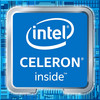Intel Celeron 3867U vs Intel Core i7-4712MQ
Intel Celeron 3867U
► remove from comparison
Der Intel Celeron 3865U ist ein sparsamer Dual-Core-SoC auf Basis der Kaby-Lake-Architektur, der im 1. Quartal 2017 vorgestellt wurde. Die CPU wird hauptsächlich in Ultrabooks, aber auch gewöhnlichen Notebooks verbaut. Neben den zwei CPU-Kernen ohne Hyper-Threading, die mit 1,8 GHz takten (kein Turbo Boost), integriert der Prozessor auch eine HD Graphics 610 Grafikeinheit sowie einen Dual-Channel-Speichercontroller (LPDDR3-1866/DDR4-2133/DDR3L-1600). Die Fertigung erfolgt in einem 14-Nanometer-Prozess mit FinFET-Transistoren. Im Vergleich zum ähnlichenIntel Celeron 3965U, ist der Celeron 3865U 400 MHz geringer getaktet.
Im Vergleich zum Celeron 3865, bietet der 3867 nur eine unterschiedlichen cTDP-down-Option (12,5 versus 10 Watt).
Architektur
Im Vergleich mit Skylake hat Intel die zugrundeliegende Mikroarchitektur praktisch unverändert übernommen, sodass sich keine Unterschiede in der Pro-MHz-Leistung ergeben. Überarbeitet wurde lediglich die Speed-Shift-Technik zur schnelleren dynamischen Anpassung von Spannungen und Taktraten, zudem gestattet der gereifte 14-Nanometer-Prozess deutlich höhere Frequenzen und eine bessere Energieeffizienz als bislang.
Performance
Der Celeron 3865U ist durch den fehlenden Turbo Boost in Einzelnkernbenchmarks deutlich langsamer als die schnelleren Core Modelle. Diese Einschränkung sollte in der täglichen Nutzung auch spürbar sein. Die Leistung sollte deutlich unterhalb des Intel Pentium 4405U und auch Celeron 3965U liegen, da die beiden Prozessorkerne relative niedrig getaktet werden.
Grafikeinheit
Die integrierte Grafikeinheit namens Intel HD Graphics 610 repräsentiert die kleinste, auch "GT1" genannte Ausbaustufe der Kaby-Lake-GPU (Intel Gen. 9) und taktet im Celeron mit 300 - 900 MHz.
Leistungsaufnahme
Dank "Configurable TDP" kann die CPU ausgehend von den standardmäßigen 15 Watt auch mit einer TDP von 10 Watt (cTDP Down) betrieben werden, wodurch sich jedoch die Performance reduziert. Je nach Einstellung ist der Chip für schlanke Note- und Ultrabooks ab etwa 11 Zoll Bilddiagonale geeignet.
Intel Core i7-4712MQ
► remove from comparison
Der Intel Core i7-4712MQ ist ein schneller mobiler Quad-Core Prozessor auf Basis der Haswell-Architektur, der im zweiten Quartal 2014 vorgestellt wurde. Dank Hyperthreading können die 4 Kerne gleichzeitig bis zu 8 Threads bearbeiten. Die in 22 Nanometern gefertigte CPU taktet mit 2,3 GHz, kann per Turbo Boost aber Frequenzen von bis zu 3,3 GHz erreichen (Turbo-Stufen: 4 Kerne: 3,0 GHz, 2 Kerne: 3,2 GHz). Als Besonderheit gegenüber anderen Quad-Core-Modellen ist der i7-4712MQ mit lediglich 37 Watt TDP spezifiziert. Im Unterschied zum 4712HQ ist die CPU nicht verlötet, sondern gesockelt, zudem fehlt VT-d.
Haswell ist der Nachfolger der 2012 vorgestellten Ivy-Bridge-Architektur und soll vor allem mit höherer Performance und verbesserter Energieeffizienz punkten. So wurde sowohl die Sprungvorhersage optimiert als auch die Zahl der Ausführungseinheiten erhöht, wodurch die Pro-MHz-Leistung um knapp 10 Prozent verbessert werden konnte. Neue Befehlssatzerweiterungen wie AVX2 und FMA sollen die Performance in darauf ausgelegten Anwendungen zusätzlich verbessern.
Die Performance des Core i7-4712MQ liegt in etwa auf dem Niveau des Core i7-4750HQ und damit knapp über der älteren Ivy-Bridge-CPU i7-3630QM. Auch anspruchsvollste Anwendungen bewältigt der i7-4712MQ dadurch ohne Probleme.
Für die Grafikausgabe zeigt sich die im Prozessor integrierte Intel HD Graphics 4600 verantwortlich, die mit 400 - 1150 MHz taktet. Das Performanceplus gegenüber der HD Graphics 4000 liegt bei rund 30 Prozent, womit sich die HD 4600 knapp hinter der Radeon HD 8650G und auf dem Level einer dedizierten GeForce GT 720M einordnet.
Gegenüber vergleichbaren Modellen der Vorgängergeneration (Ivy Bridge: 35 Watt) ist die maximale Leistungsaufnahme des i7-4712MQ auf 37 Watt (TDP) angestiegen, was auf die Integration der Spannungsregler in die CPU zurückzuführen ist. Damit ist die CPU am besten für Notebooks ab etwa 14 Zoll geeignet.
| Model | Intel Celeron 3867U | Intel Core i7-4712MQ | ||||||||||||||||||||||||||||||||||||||||||||||||||||||||||||||||||||||||||||||||||||||||||||||||||||||||||||||||||||||||||||||||||||||||||||||||||||||||||||||||||||||||||||||||||||||||||||||||||||||||||||||||||||||||||||||||||||||||||||||||||||||||||||||||||||||||||||||||||||||||||||||||||||||||||||||||||||
| Series | Intel Kaby Lake | Intel Core i7 | ||||||||||||||||||||||||||||||||||||||||||||||||||||||||||||||||||||||||||||||||||||||||||||||||||||||||||||||||||||||||||||||||||||||||||||||||||||||||||||||||||||||||||||||||||||||||||||||||||||||||||||||||||||||||||||||||||||||||||||||||||||||||||||||||||||||||||||||||||||||||||||||||||||||||||||||||||||
| Codename | Kaby Lake | Haswell | ||||||||||||||||||||||||||||||||||||||||||||||||||||||||||||||||||||||||||||||||||||||||||||||||||||||||||||||||||||||||||||||||||||||||||||||||||||||||||||||||||||||||||||||||||||||||||||||||||||||||||||||||||||||||||||||||||||||||||||||||||||||||||||||||||||||||||||||||||||||||||||||||||||||||||||||||||||
| Serie: Core i7 Haswell |
|
| ||||||||||||||||||||||||||||||||||||||||||||||||||||||||||||||||||||||||||||||||||||||||||||||||||||||||||||||||||||||||||||||||||||||||||||||||||||||||||||||||||||||||||||||||||||||||||||||||||||||||||||||||||||||||||||||||||||||||||||||||||||||||||||||||||||||||||||||||||||||||||||||||||||||||||||||||||||
| Clock | 1800 MHz | 2300 - 3300 MHz | ||||||||||||||||||||||||||||||||||||||||||||||||||||||||||||||||||||||||||||||||||||||||||||||||||||||||||||||||||||||||||||||||||||||||||||||||||||||||||||||||||||||||||||||||||||||||||||||||||||||||||||||||||||||||||||||||||||||||||||||||||||||||||||||||||||||||||||||||||||||||||||||||||||||||||||||||||||
| L1 Cache | 128 KB | 256 KB | ||||||||||||||||||||||||||||||||||||||||||||||||||||||||||||||||||||||||||||||||||||||||||||||||||||||||||||||||||||||||||||||||||||||||||||||||||||||||||||||||||||||||||||||||||||||||||||||||||||||||||||||||||||||||||||||||||||||||||||||||||||||||||||||||||||||||||||||||||||||||||||||||||||||||||||||||||||
| L2 Cache | 512 KB | 1 MB | ||||||||||||||||||||||||||||||||||||||||||||||||||||||||||||||||||||||||||||||||||||||||||||||||||||||||||||||||||||||||||||||||||||||||||||||||||||||||||||||||||||||||||||||||||||||||||||||||||||||||||||||||||||||||||||||||||||||||||||||||||||||||||||||||||||||||||||||||||||||||||||||||||||||||||||||||||||
| L3 Cache | 2 MB | 6 MB | ||||||||||||||||||||||||||||||||||||||||||||||||||||||||||||||||||||||||||||||||||||||||||||||||||||||||||||||||||||||||||||||||||||||||||||||||||||||||||||||||||||||||||||||||||||||||||||||||||||||||||||||||||||||||||||||||||||||||||||||||||||||||||||||||||||||||||||||||||||||||||||||||||||||||||||||||||||
| Cores / Threads | 2 / 2 | 4 / 8 | ||||||||||||||||||||||||||||||||||||||||||||||||||||||||||||||||||||||||||||||||||||||||||||||||||||||||||||||||||||||||||||||||||||||||||||||||||||||||||||||||||||||||||||||||||||||||||||||||||||||||||||||||||||||||||||||||||||||||||||||||||||||||||||||||||||||||||||||||||||||||||||||||||||||||||||||||||||
| TDP | 15 Watt | 37 Watt | ||||||||||||||||||||||||||||||||||||||||||||||||||||||||||||||||||||||||||||||||||||||||||||||||||||||||||||||||||||||||||||||||||||||||||||||||||||||||||||||||||||||||||||||||||||||||||||||||||||||||||||||||||||||||||||||||||||||||||||||||||||||||||||||||||||||||||||||||||||||||||||||||||||||||||||||||||||
| Technology | 14 nm | 22 nm | ||||||||||||||||||||||||||||||||||||||||||||||||||||||||||||||||||||||||||||||||||||||||||||||||||||||||||||||||||||||||||||||||||||||||||||||||||||||||||||||||||||||||||||||||||||||||||||||||||||||||||||||||||||||||||||||||||||||||||||||||||||||||||||||||||||||||||||||||||||||||||||||||||||||||||||||||||||
| max. Temp. | 100 °C | 100 °C | ||||||||||||||||||||||||||||||||||||||||||||||||||||||||||||||||||||||||||||||||||||||||||||||||||||||||||||||||||||||||||||||||||||||||||||||||||||||||||||||||||||||||||||||||||||||||||||||||||||||||||||||||||||||||||||||||||||||||||||||||||||||||||||||||||||||||||||||||||||||||||||||||||||||||||||||||||||
| Socket | BGA | FCPGA946 | ||||||||||||||||||||||||||||||||||||||||||||||||||||||||||||||||||||||||||||||||||||||||||||||||||||||||||||||||||||||||||||||||||||||||||||||||||||||||||||||||||||||||||||||||||||||||||||||||||||||||||||||||||||||||||||||||||||||||||||||||||||||||||||||||||||||||||||||||||||||||||||||||||||||||||||||||||||
| Features | Dual-Channel LPDDR3-1866/DDR4-2133/DDR3L-1600 Memory Controller, HyperThreading, AVX, AVX2, Quick Sync, Virtualization, AES-NI | HD Graphics 4600 (400 - 1150 MHz), DDR3(L)-1600 Memory Controller, HyperThreading, AVX, AVX2, Quick Sync, Virtualization, AES-NI | ||||||||||||||||||||||||||||||||||||||||||||||||||||||||||||||||||||||||||||||||||||||||||||||||||||||||||||||||||||||||||||||||||||||||||||||||||||||||||||||||||||||||||||||||||||||||||||||||||||||||||||||||||||||||||||||||||||||||||||||||||||||||||||||||||||||||||||||||||||||||||||||||||||||||||||||||||||
| iGPU | Intel HD Graphics 610 (300 - 900 MHz) | Intel HD Graphics 4600 (400 - 1150 MHz) | ||||||||||||||||||||||||||||||||||||||||||||||||||||||||||||||||||||||||||||||||||||||||||||||||||||||||||||||||||||||||||||||||||||||||||||||||||||||||||||||||||||||||||||||||||||||||||||||||||||||||||||||||||||||||||||||||||||||||||||||||||||||||||||||||||||||||||||||||||||||||||||||||||||||||||||||||||||
| Architecture | x86 | x86 | ||||||||||||||||||||||||||||||||||||||||||||||||||||||||||||||||||||||||||||||||||||||||||||||||||||||||||||||||||||||||||||||||||||||||||||||||||||||||||||||||||||||||||||||||||||||||||||||||||||||||||||||||||||||||||||||||||||||||||||||||||||||||||||||||||||||||||||||||||||||||||||||||||||||||||||||||||||
| $107 U.S. | $378 U.S. | |||||||||||||||||||||||||||||||||||||||||||||||||||||||||||||||||||||||||||||||||||||||||||||||||||||||||||||||||||||||||||||||||||||||||||||||||||||||||||||||||||||||||||||||||||||||||||||||||||||||||||||||||||||||||||||||||||||||||||||||||||||||||||||||||||||||||||||||||||||||||||||||||||||||||||||||||||||
| Announced | ||||||||||||||||||||||||||||||||||||||||||||||||||||||||||||||||||||||||||||||||||||||||||||||||||||||||||||||||||||||||||||||||||||||||||||||||||||||||||||||||||||||||||||||||||||||||||||||||||||||||||||||||||||||||||||||||||||||||||||||||||||||||||||||||||||||||||||||||||||||||||||||||||||||||||||||||||||||
| Manufacturer | ark.intel.com | ark.intel.com | ||||||||||||||||||||||||||||||||||||||||||||||||||||||||||||||||||||||||||||||||||||||||||||||||||||||||||||||||||||||||||||||||||||||||||||||||||||||||||||||||||||||||||||||||||||||||||||||||||||||||||||||||||||||||||||||||||||||||||||||||||||||||||||||||||||||||||||||||||||||||||||||||||||||||||||||||||||
| Transistors | 1400 Million | |||||||||||||||||||||||||||||||||||||||||||||||||||||||||||||||||||||||||||||||||||||||||||||||||||||||||||||||||||||||||||||||||||||||||||||||||||||||||||||||||||||||||||||||||||||||||||||||||||||||||||||||||||||||||||||||||||||||||||||||||||||||||||||||||||||||||||||||||||||||||||||||||||||||||||||||||||||
| Die Size | 177 mm2 |


 Deutsch
Deutsch English
English Español
Español Français
Français Italiano
Italiano Nederlands
Nederlands Polski
Polski Português
Português Русский
Русский Türkçe
Türkçe Svenska
Svenska Chinese
Chinese Magyar
Magyar
